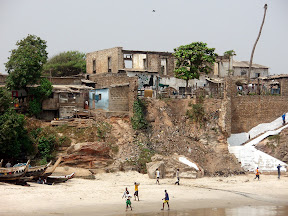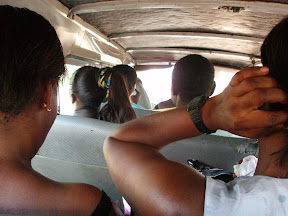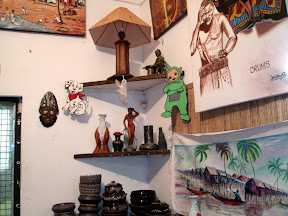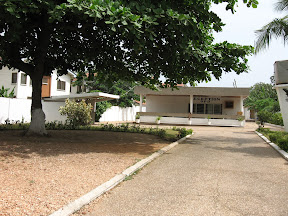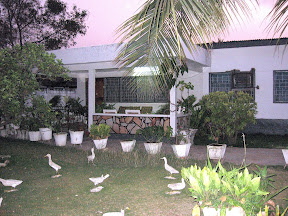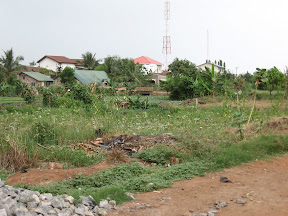As soon as we passed over the Volta River and into the next region there was a change in the air and I knew it was worth the wasted afternoon. A woman from the bus told us what options we had to get back to Accra and offered to drive us to the YMCA hostel that night and to the tro tro station the next morning. She and her husband were so nice and helpful we almost felt bad. The hostel was a little scary; the hallway smelt like urine, the linens were questionable, and the windows were the first ones without bars I’ve seen since arriving. I offered to take the single room which ended up better than the double with very vocal and early rising roosters and goats outside the window. Thanks to our new friends we were easily shoved into a car and were off early in the morning.
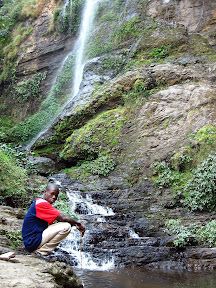
Amedzofe is the highest altitude town on the second highest mountain in Ghana. It has a well-established tourist centre due to a series of Peace Corps volunteer placements. We got a clean room with our own washroom (unfortunately no running water – dry season) in a Christian guesthouse. A boy from the tourist office took us down to the waterfall about half an hour from town. I was happy to hear that someone from small town like this was working to get money to go to university for agriculture and return home with his knowledge. We made our way through rainforest-like terrain with the help of a rope which saved me from injuring myself and my camera. The waterfall, at about 300 m tall (or something tall), was beautiful. We were told that it’s ten times that size in the rainy season; however I can’t imagine getting down there with mud. On the way up I realized how out of shape I was from two months of carbs, inhaling exhaust, and no exercise. Climbing to the top of the Mount Gemi seemed insignificant after that, although the sun was strong and hot. The German missionaries who crashed the town in the 1930s erected a cross at the top where we stopped for lunch. It was really refreshing to be in a town that didn’t make a big deal of three white girls wandering around. Most people greeted us with “You are welcome” or “How are you?” Hopefully it’s their way of showing appreciation for the development our tour money provides. Two currents examples are erecting streetlamps and planting rubber trees. The townspeople even invited us to the wake for an elder who just died. We didn’t stick around for long after we discovered the celebration involves lots of palm wine and riffles. Another refreshing surprise came at night when the temperate actually dropped below 25 degrees and the wind kept all mosquitoes away. I went to sleep wondering why I was working in choked Accra. Then I realized how different my life would be living in a small town with not one computer, sparse transportation, and no running water.
We were up with the sun the next morning and hiking down the mountain before 7am. Once every 15 minutes we would stop, look up and around, and realize it’s two days to Christmas and we’re hiking down a mountain in Africa. It was amazing but my quads are definitely punishing me now. When we hit the main road it was easy to find a taxi to Tafi Atome. This tiny town housed a monkey sanctuary for Ghana’s only population of mona monkeys. The chief has played a critical role in preserving the forest, thereby increasing the number of monkey tribes. As soon as we started our tour, before we even got into the forest, a tribe found us and our bananas. We probably saw at least thirty monkeys in the trees, about ten (including the sizable leader) were brave enough to jump around the tree above us and a few ate from our hands. Shortly the leader cried out for the tribe to retreat into the shade of the woods and we went for the rest of our hike. It was short and sweet; I was so happy to finally see monkeys up close.
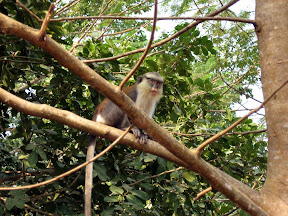
By this time we had learned that the strategy for traveling with no set route or accommodation was to ask how to get out of town as soon as you arrive. This time we opted for walking 5 kilometres down the dirt road to the junction. It was VERY long, but we made it out before the clock struck midday. Two very full tro tros later (I’m glad I can still pack my stuff into small bags) we made it to Kpando, a mid-sized town near the Volta. The main attractions are some impressive German cathedrals and a women’s pottery cooperative. When we reached the potters’ “suburb”, we discovered that we were crashing a funeral. We had no choice but to approach and try not to attract too much attention (near impossible). Once we found someone who knew what we were talking about, they fetched some of the women out of the funeral. We felt bad for interrupting, but really, funerals are three-day events and happen once a month. If they didn’t conduct business during funerals nothing would ever get done. I think we made it worth their time and we were happy to get some more gifts and support a women’s group.
Back in town we decided to try for a car back to Accra instead of another night in a hostel. We weren’t even at the tro tro station when a car passed yelling Accra. We hopped on the deluxe tro tro (surround sound, individual seats, high ceilings, faux carpeting) and made it home in under 4 hours. It was the perfect end to a perfect, exhausting two days.
